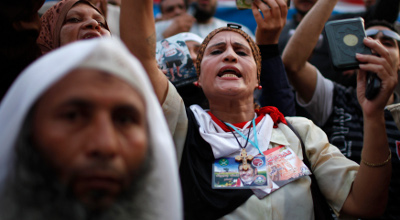Christians Fearful After Egypt Elects First Islamist President
A Muslim Brotherhood candidate was elected the president of Egypt on Sunday, giving greater control to Islamists amidst an ongoing power struggle with the military council.
Christians are concerned that Egypt may soon become an Islamic state now that Mohammed Morsi has moved into Hosni Mubarak’s former office.
The delayed results of the presidential election, which were initially scheduled to be announced on June 21, led many to believe that the Supreme Council of the Armed Forces (SCAF) would seize the presidency by installing ally Ahmed Shafiq as the head of state.
But on June 24, after a week of massive protests in Cairo denouncing the SCAF’s refusal to hand over power to a civilian leader, the electoral commission announced that Morsi, a Muslim Brotherhood candidate, edged out a defeat over Shafiq. The Brotherhood victory marks the first time an Islamist was elected head of Egypt.
The results of the presidential election will unlikely resolve the power struggle between the SCAF and the Brotherhood. Days before the election, the SCAF dissolved the Islamist-dominated Parliament and decreed an interim Constitution that degrades the presidency to a subservient role.
The move extends the SCAF’s hold on legislative power and abolishes the SCAF’s commitment to hand over power to a civilian government by the end of June. The Brotherhood has vowed to “fight in the courts and the streets to reinstate the Parliament,” The New York Times reported.
Aidan Clay, ICC regional manager for the Middle East, said, many Christians in Egypt were convinced that Shafiq was their last hope for a peaceful existence.
“The Muslim Brotherhood presidential campaign demanded an immediate transition to a Sharia state and a Caliphate, leaving no room for Christians within Egyptian society,” Clay said.
“With the election of Mohammed Morsi, Christians are now looking to the military council—who refuses to hand over power to Islamists—for protection. If not for the military’s decree to dissolve Parliament on June 14, the Muslim Brotherhood would control both the Parliament and the presidency, which would likely lead to an increase of persecution and a mass immigration of Christians from Egypt.
Egypt’s Coptic Christian minority, who overwhelmingly supported the defeated Shafiq, are fearful that Morsi will stifle religious freedoms and persecute non-Muslims.
“I personally will not recognize Morsi as president. Egypt deserves much better than Morsi,” Wagih Yacoub, a Coptic human rights activist, told International Christian Concern. “I will not recognize the terrorist and bloody group—the Brotherhood of Muslims. Christian people are scared, they are worried. … Last night people chanted ‘We have an Islamic State, Morsi is the president!’ The people behind Morsi elected religion, not a president. They went to vote for Islam.”
“For most Copts, it’s doomsday,” Joe Fahim, a Christian in Cairo, told Reuters.
Clay said Christians and all Egyptians are wondering what role the president will have. Will Morsi be stripped of most of his presidential powers by the military, making him nothing more than a figurehead? Or, will the Brotherhood and other Islamist groups embark on a campaign of armed resistance until the military steps down? “The answer to these questions, he said, “will inevitably determine the fate of Egypt’s ancient Christian community.















































